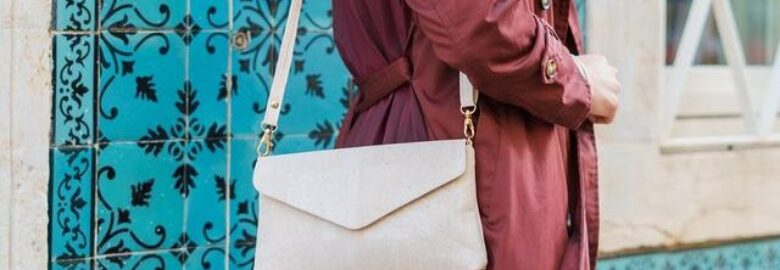Quirk Collection
Simple, sustainable cork handbags
Cork Handbags with planet-friendly materials
Our Story
The Quirk philosophy is pretty straightforward: Create timeless handbags with planet-friendly materials and people-friendly production methods.
Quirk was created by Devika and Alison, two women who shared two qualities: the belief that it is possible to build a successful business that is both socially and environmentally conscious, and the feeling that something was missing from their wardrobes – a simple, sustainable handbag. After searching far and wide, it turned out that finding great-looking sustainable, ethically made bags was a tall order; most leather and vegan polyurethane leather alternatives on the market are straight-up unsustainable and unethical. Frustrated by a lack of options, they decided to build their own brand.
Taking a leap

Driven by this new mission to develop an eco-friendly line of ethically made handbags, Devika discovered cork, our hero material, late one night in the depths of the internet. She read all about how cork was a vegan, renewable alternative to leather that literally grows on trees and was instantly hooked. She learned that the majority of cork was grown and manufactured in Portugal and not long after, officially brought Alison on board as her co-founder, packed up her life in Chicago, and flew to Portugal to start Quirk.
Building the brand

With Alison on the other side of the world in Sydney, Australia, the two navigated time zone differences to build Quirk brick by brick. After overcoming the obstacles posed by living in a new country with no connections in the middle of a global pandemic, Devika finally met a small, family-owned factory in Porto and got to work designing our first bag, The Lisbon.
For the last few months, Devika and Alison have been working hard to bring their vision to life, collaboratively refining iteration after iteration of The Lisbon, crafting a brand identity, developing a website, and generally navigating all the ins and outs of setting up a new business. Now, after months of hustle, it’s time for the world to meet Quirk.
We hope you will join us on our mission to make fashion friendlier to people and the planet.
Cork as a Material
Cork is a material you can truly feel good about; it is a renewable, natural material, helps absorb CO2, and is completely vegan and cruelty-free. We like to think of it as nature’s leather. Cork delivers durability far superior to leather, without the nasty chemicals or moral dilemma. Kinder to people, kinder to animals, kinder to the planet.
How is cork sustainable?
Cork is a natural material that helps sequester CO2, a major contributor to global warming. Cork comes from the bark of a tree but no cork trees are harmed or cut down during harvest. Cork oak trees typically live between 150 to 200 years tree and are harvested once every 9 years. That means each cork tree is harvested over 50 times throughout its life, making cork a renewable material.
The act of harvesting cork trees actually helps in the fight against climate change because harvested trees absorb CO2 as they regenerate bark. Harvested cork trees absorb 3-5 times more CO2 than non-harvested cork trees.
Unlike leather, which has a chemical and energy-intensive tanning process, the process of transforming cork bark into fabric is quite simple and free of nasty chemicals.
Where does cork come from?
Cork comes from the bark of the Quercus suber, more commonly known as the cork oak tree. Cork oak trees are found throughout southwestern Europe and northwestern Africa in Portugal, Spain, France, Italy, Algeria, Morocco and Tunisia.
All of the cork used in Quirk bags is sourced from Portugal. Portugal has the largest population of cork oak trees in the world, and also leads the world in cork production, producing over 50% of the world’s cork supply. In Portugal, it is illegal to cut down a cork without special permission from the government.
What are the benefits of cork?

Cork is resistant to liquids. Cork has a natural cell membrane that makes it impermeable to liquids and gases. Spill something on your bag? Caught in the rain? No worries! Liquids will not damage your cork bag.
Cork is vegan. Cork is made from tree bark, not animal skin. No animals (or trees!) are harmed in the making cork fabric.
Cork is easy to clean. Since cork is water-resistant, it is very easy to clean. All you need to do is give your bag a wipe with a damp cloth and maybe some soap and it will be good as new.
Cork is super lightweight. When people hold a Quirk bag for the first time, they say, “It’s so light!” That’s because cork’s honeycomb cell structure cell is made up of lots of tiny air pockets.
Cork is soft. Cork is incredibly soft and smooth to the touch. It’s so soft, you’re probably going to find yourself stroking your bag from time to time.
Cork is durable. Thanks to a high friction coefficient, cork stands up to the general wear and tear a typical purse might experience.
Cork is pliable. Cork cell membranes are extremely flexible, so cork will always return to its original shape, no matter what sort of pressure it is put under.
How is cork fabric made?
1) Bark is harvested from the cork oak tree by “tiradores” or “cork strippers” who use handheld axes to carefully peel the bark from the tree.
2) Cork bark is boiled and steamed to make the material more flexible and manageable.Heat and pressure are applied to press the cork into blocks.
3) Cork blocks are sliced into thin sheets and glued to a fabric backing to create cork fabric.


